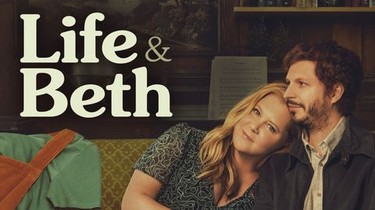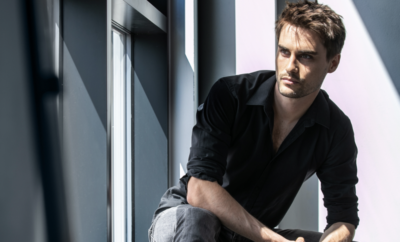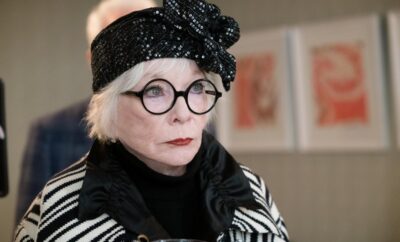Interviews
Kristen Wiig & Sebastian Silva – Nasty Baby
By: Erin Faith Wilson
Q) Kristen, what drew you to this project?
Kristen: Sebastian [Silva] is pretty much the short answer to that, but Alia Shawkat is a friend of mine and told me the film and about Sebastian. I saw his film Crystal Fairy and talked to Sebastian on the phone briefly and I just knew. When you know, you just know.
Q) Sebastian, you have sort of an energy to your body of work no matter what genre you’re covering and I was wondering if growing up were you a huge cinefile and did movements such as The French New Wave or Italian Neorealism influence your story telling and your esthetic now?
Sebastian: To be completely honest, I never wanted to make movies in the first place. Let me tell you a story to show you how little of a cinefile I was growing up: I entered this very tiny film school in Chile and they asked us to bring in our favorite films. I didn’t have one, so I went through my parents house and found a VHS of Nightmare on Elm Street 3 so that’s the movie I brought. It was the only movie I could find and then we had to say why we liked it. I was just making stuff up like, “I love when they are sitting on the sofa and you look and then there is no room anymore.” I guess after that I started becoming a little more savvy. I really admire Lars von Trier’s work and The Dogme Movement hit me really strongly. t felt like finally there wasn’t heavy make up and the shots were done really well.
Q) Kristen, can you talk a little bit about the difference between making a film like this and doing a big production movie. What was it like and how did you adapt to that?
Kristen: It’s hard to say because I feel like I have done a lot of smaller films and there is definitely a different energy on set when you have those resources. We shot so much in one day and we didn’t have craft service. It was more like a table with pretzels (laughs), which was great! There is something great about both of them, but doing a movie like this, it really feels like you’re just running around Brooklyn with a camera yet it’s important and artistic and fun. There is also something great about doing something bigger, too. I don’t know. I think when you are on set in that environment you just adapt to where you are. It’s hard to say, “Oh I like doing this better” or “This one’s not as good because,” but I really do like making small films.
Q) Sebastian, I wanted to get your take on the title, Nasty Baby. What does it mean to you and how did you come up with it?
Sebastian: It was basically on a performance I thought I was going to do like sixteen years ago. They invited me to do a five minute piece for a dance week sort of thing in Chile and I came up with this idea and called it Nasty Baby. The performance was me rolling around on the floor like a three month old baby in front of an audience and the point was that I would become so embarrassed along with the audience becoming so embarrassed that we would all together as a group go through the trestle of embarrassment and grow spiritually. But I never did it, the project was rejected. (laughs)
Kristen: But we did it! It was like on the first day of shooting and we all had to do it and it is really embarrassing because other people are watching!
Sebastian: It comes from when adult couples baby talk to each other. It’s so disgusting and disturbing that it was like, “What if you made that over and over again” and that’s what happens when you perform Nasty Baby. I recommend you try it at home with people who love you unconditionally (laughs).
Q) Kristen, can you talk about your character and what its like to work with Sebastian?
Kristen: When we talked on the phone before we started it was like we had already known each other. It was so easy and we instantly became friends. Our characters were close friends in the movie and I feel like we got to know each other more during the movie and playing each others best friend. It was very inspiring to me to also watch him work and sometimes take the camera and to just watch him make this whole piece of art that he had in his brain for so long. My character Polly, is Sebastian’s (Freddy in the film) best friend and I’m trying to have a baby with him and trying to get his sperm to work (laughs) and its not working so we ask his boyfriend Mo….
Sebastian: Right and then Mo [Tunde Adebimpe] is second guessing because his family is an African American conservative family from Ohio and Polly is really pushy in regards to having the baby, sort of like now or never type thing. It was such an easy collaboration though. I don’t usually audition people and the fact that she was friends with Alia and such a charming lady made it easy. It was the same with the other actors as well; we just shared a connection and the same critical views.
Q) The handheld camera seemed to give the actors a lot of room to move around in a way they wouldn’t have had otherwise. Did you find a special kind of freedom in that with this film?
Kristen: Uh, yeah I did! You just sort of feel like you can be those people and do the scene and the cameraman will just sort of find you. If we wanted to do it again we would have to figure out where to go, but there was a lot of freedom and there weren’t a lot of marks that we had to follow.
Sebastian: Also, in movies like this that aren’t fully scripted all of the actions are written of course and we know what needs to happen in every scene, but there were a lot of times we didn’t even use the slate and we moved to new frames without cutting ever. I feel like for actors to be cutting all the time, they don’t really get to enjoy performing as much like when you improvise a take and go for as long as 35 minutes sometimes.
Q) Kristen, obviously you come from an improv world, do you enjoy having that aspect of it when you do a project like this and do you kind of go through it and know there are certain things you know you want to get in there?
Kristen: Yeah, but that’s more Sebastian than me and before we would do the scene we would talk about what needed to happen and where everyone was coming from. There wasn’t specific dialogue, but we knew what needed to happen in each scene. I have never done improv in a dramatic sense before so I was actually a little nervous about it because I wasn’t sure how that was going to go.
Q) Kristen, I just want to ask you about your comedic approach to a film like this because there really are some funny moments and they come out so organically and so subtly. It was a different approach comedically to those moments than say doing a character on Saturday Night Live or in some of the border films you have done?
Kristen: Yeah, I think a lot of the comedic stuff that happened in the film just kind of happened organically because Sebastian and I are just really silly with each other. We also wanted to show that these two friends had a very light relationship with each other especially because the film does take a darker turn later. I mean, there is always that fine line, for me. I never know if people want something to be funny or they expect it to be funny because I have a comedic background, but for this the little light moments just sort of happened.
Sebastian: Even a drama can have elements of comedy. Just because someone is going to die in the movie doesn’t mean everyone has to be dead panel throughout the entire thing before that person dies. There is comedy in life constantly and you can be laughing one minute and the next minute something traumatic happens. Tragedy doesn’t always happen gradually. So yeah, like Kristen said, these people are semi-smart people that have a sense of humor that are living their lives.
Kristen: People always talk about how the movie has such a big turn and I just say, “Well, that happens.” Sometimes something horrible happens, but you could have been having a great morning prior to it.
Q) Kristen can you describe your process for preparing for not only this role, but other roles you have played?
Kristen: I don’t know if I have a specific process. In fact, I know that I don’t (laughs). Each role is different and it just depends on what I am doing and if I have a script that I know I am playing a certain person, usually I spend time talking to the directors about what they want and figuring it out with them. Every project is so different, you approach comedy so much different than drama or if your part is really big and you have an arc or a change. It really is, for me, talking to the director and the writer because I feel like the writer has the whole idea and the characters have come from them so they know them better than anyone. I know when the director comes on they have their whole thing but it’s important to have a dialogue and respect for the writer.
Q) Kristen can you reflect on your success from television to films and do you miss television? There is a new crop of funny women coming in behind you like Amy Schumer, can you talk about this landscape, but from a personal perspective?
Kristen: Well, it’s very hard to have perspective on yourself, (laughs) but I miss “Saturday Night Live” a lot. I just went back for the first show and I still get the pang of not being “in the group” anymore. I do really miss it and miss being in New York and being on that show. I love Amy and it’s exciting to me to see this happening and that Trainwreck did so well. It’s hard to comment on it because I am always asked how are women in comedy different now than it was back then and I feel like I am always going to be asked that. I am just going to say that its still a struggle and, yes, there are more roles for men. That’s just the way the business is and it has always been that way. I do think its getting better, but we still have a ways to go and I think comedy is changing fast and a lot of really big names in comedy are women and that’s amazing.





You must be logged in to post a comment Login